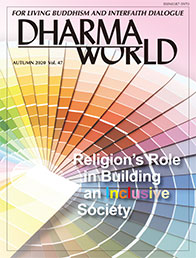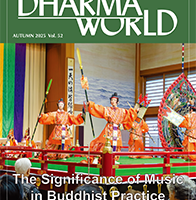Religion’s Role in Building an Inclusive Society (Autumn 2020)
“Inclusive society” has long been a buzzword in the world of politics, education, not to mention the field of social welfare.
Although it may seem self-evident, what exactly is an inclusive society? According to the Raoul Wallenberg Institute, an academic institution affiliated with Lund University in Sweden, “An inclusive society aims at empowering and promoting the social, economic, and political inclusion of all, irrespective of age, sex, disability, race, ethnicity, origin, religion, economic, or other status. It is a society that leaves no one behind.”
Building an inclusive society is an important objective for people of faith. The Vienna Declaration of Religions for Peace states: “While we recognize that some religious believers betray the peace teachings of their faiths, we continue to commit ourselves—and our communities—to a culture of Peace that advances shared well-being, grounded in common healing, common living, and shared security.” Religions for Peace made clear that “common living,” or building an inclusive society, is a basis for the cultivation of peace.
However, while religions proclaim universal love and work toward liberation and hope for those who suffer, on occasion they have unfortunately also served to increase human agony. Religion has sometimes become the basis of prejudice, discrimination, and confrontation, and religious tenets have provided doctrinal grounds for a discriminatory social structures.
The international community has been taking steps toward building an inclusive society through such measures as concluding treaties to abolish various kinds of discrimination, and prompting national governments to establish legal systems to enhance human rights. Discrimination remains in many aspects of life, but we trust that humanity is moving toward realizing “a culture of peace,” a goal established by religious leaders in the Vienna Declaration.
How can religions develop a strategy for building an inclusive society? How will they collaborate with people of other walks of life, including specialists in welfare, law, and education, to sustain a movement to achieve these goals? At Dharma World we will consider religion’s role in creating a society in which every individual is ensured of the dignity of life and has an active role to play.























































































